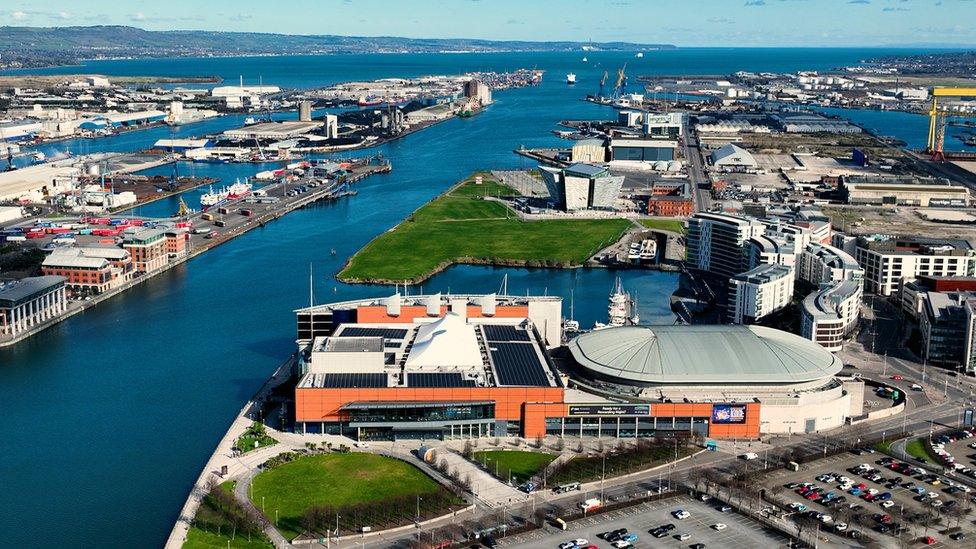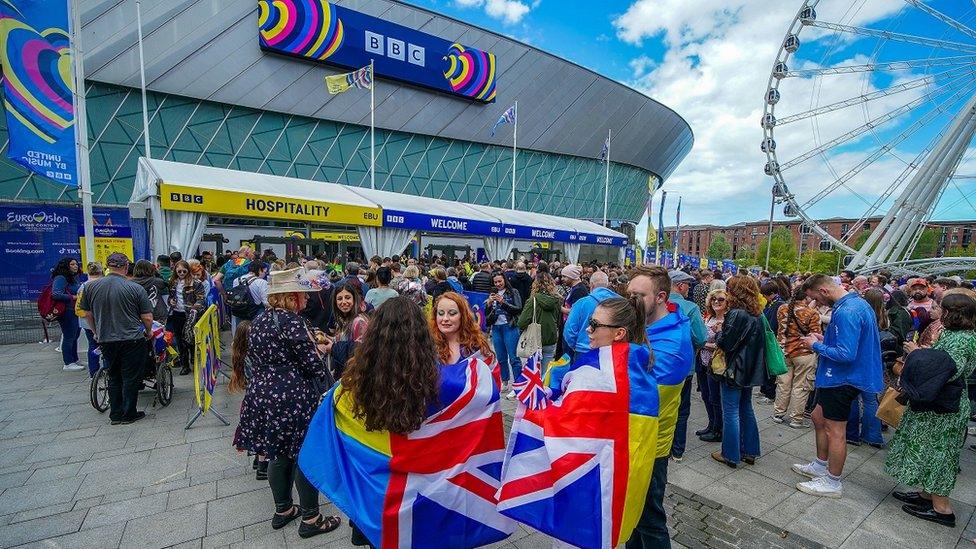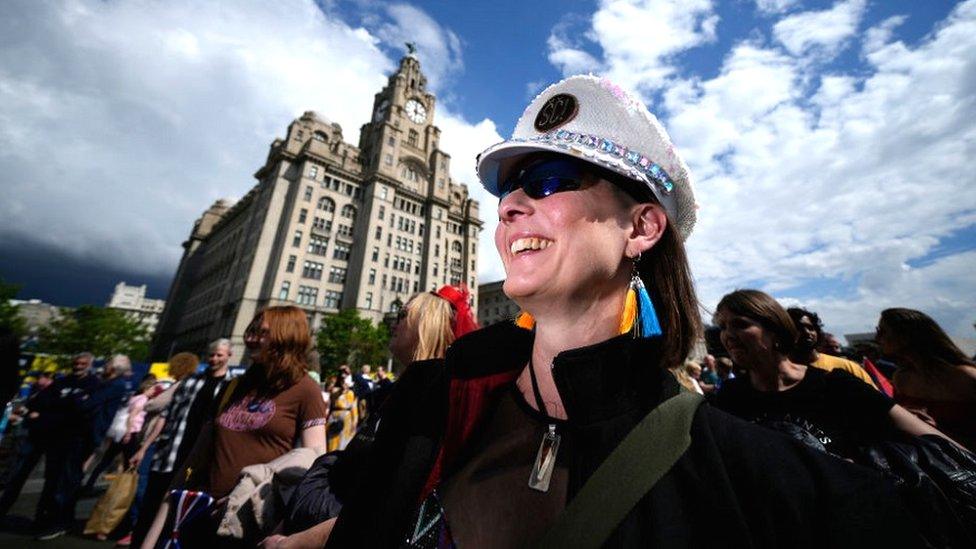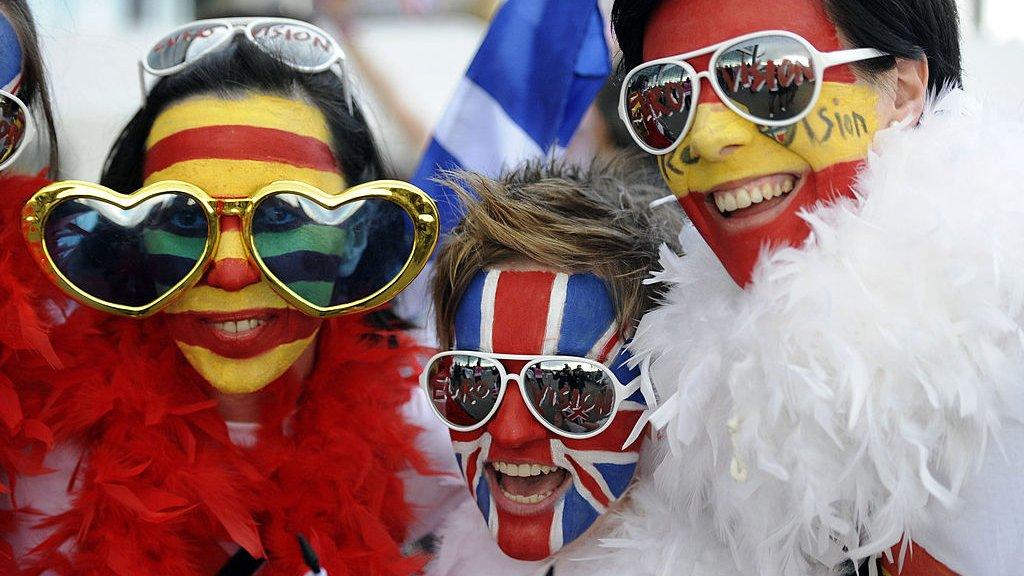Belfast Eurovision bid hurt by infrastructure, instability and arena
- Published

Mae Mueller will be representing the UK in Liverpool - but Belfast's hopes of hosting were dashed in 2022
A too-small arena, political instability and infrastructure concerns were key factors in Belfast's failed bid to host the Eurovision Song Contest, BBC News NI has been told.
Ukraine won last year's contest but due to the war with Russia; second-place UK was chosen to host.
Last summer 20 cities bid for the event, with Belfast failing to make a shortlist of seven.
Liverpool was chosen and will host thousands at the song contest later.
BBC News NI has obtained a copy of Belfast City Council's bid to host the contest through a freedom of information request.
Sources with knowledge of the feedback given to the council on its failed bid spoke to BBC News NI on condition of anonymity.
They said several issues were raised including:
the proposed venue, the SSE Arena, was too small and it was unclear whether it was available for the eight weeks required to put on the contest
the political instability in Northern Ireland and its potential effect on funding
concerns over Belfast's infrastructure and the city's ability to host large-scale events
The last major music event held in the city, as referenced on council's bid, was the MTV European Music Awards in 2011.
In an email to the council seen by BBC News NI, the BBC's Eurovision bid team said Belfast "does not meet the minimum standards required" to be a host city or "did not score sufficiently high in comparison to others on experience".
SSE Arena issues
One source told BBC News NI that a key issue was that the SSE Arena was "too small for the show they wanted to put on".
The bid application form for the BBC, the host broadcaster, and the European Broadcast Union (EBU) stipulated the minimum capacity for the host venue was 10,000 people.

The SSE Arena was deemed not to have the minimum capacity required, according to a source
While the SSE Arena has an advertised capacity of 10,800, the source said staging and other sets would have reduced that to about 8,500.
A further issue was that it was not confirmed whether the arena would be available for the full eight weeks needed to host the song contest.
Belfast's bid application ticked a box indicating yes, but a council officer added: "The SSE Arena currently has a number of events contracted for this period. We are working in conjunction with the arena and affected promoters to secure the required availability."
It said it was unable to complete those negotiations due to "time constraints".
Political uncertainty
Northern Ireland has been without a power-sharing government since February 2022 - and that too appears to have played a part in Belfast's bid not attracting enough support.
A source told BBC News NI that "political instability" was raised by the organisers giving feedback.
The Northern Ireland Executive collapsed after the Democratic Unionist Party (DUP) pulled out of power-sharing in protest at post-Brexit trading arrangements known as the Northern Ireland Protocol.
On top of the general uncertainty, issues over funding may have stymied Belfast's bid.
The application form states that host cities have historically contributed between €10-20m (£8.7-17.4m) to the hosting of the contest.

Belfast was one of 20 cities to bid for the event but did not make it onto the shortlist of seven
It asked those bidding: "Is your local authority in a financial position to provide/release that level of support (or above) between now and May 2023?"
In response the council outlined that it had an expenditure of £167m and that it is "fully aware of the possible costs".
The council went on to say it was liaising with the non-functioning Northern Ireland Executive as well as the government's Northern Ireland Office.
However, a source said organisers were concerned about the absence of local ministers making it more difficult to get the necessary funding.
Had Belfast made it to the next stage of the bidding process, the council, as the lead agency in the bid, would have needed to make "binding" financial commitments.
A source also said general infrastructure around the city, such as the transport network, was raised as an issue.
They said Belfast was not seen as a place that could host large-scale events.
The Eurovision Song Contest website noted, external that the host city selection process was "heavily weighted towards demonstrating past experience in hosting major international events, as well as being able to demonstrate credentials in hosting a celebration of contemporary music".
'Liverpool's familiar with big events'
Simon Hamilton, the chief executive of the Belfast Chamber of Commerce, said Liverpool's successful bid showed the benefit of a city hosting major events on a regular basis, such as Premier League matches.
"We were disappointed that the bid was unsuccessful but there were other great contenders," he said.
Birmingham, Leeds, Manchester, Newcastle and Sheffield were the among the bids to progress to the next stage, with Liverpool and Glasgow going onto the final two.
Mr Hamilton said: "You can see Liverpool has great infrastructure in place.

Thousands of fans have descended on Liverpool for the 2023 contest
"There is familiarity of more big events being hosted in [Liverpool]."
He said there were "lessons to be learned" from Belfast's bid when attempting to attract major events in the future.
Within the cultural elements of Belfast's bid, the council hoped to use Northern Ireland's status as a post-conflict society to resonate with the would-be hosts Ukraine.
The bid stated: "Once characterised by conflict, we understand the importance of peace more than any other potential host.
"This common experience is why we've galvanised in support of Ukraine."
Among the proposed plans to pay homage to Ukraine was to invite 2022's Eurovision winners, the Kalush Orchestra, to perform at Belfast's St Patrick Day's concert and open a Ukrainian cultural centre.


Related topics
- Published13 May 2023

- Published12 May 2023

- Published2 May 2023

- Published10 May 2023
